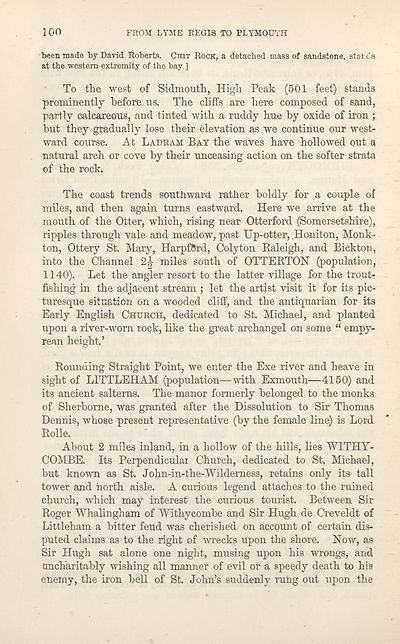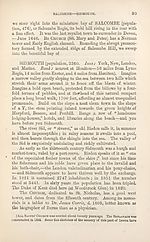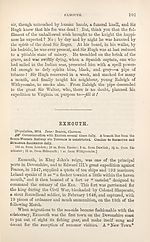Download files
Complete book:
Individual page:
Thumbnail gallery: Grid view | List view

100
FROM LYME REGIS TO PLYMOUYI
been made by David Roberts. Chit Rock, a detached mass of sandstone, stares
at the western extremity of the bay]
To the west of Sidmouth, High Peak (501 feet) stands
prominently before ns. The cliffs are here composed of sand,
partly calcareous, and tinted with a ruddy hue by oxide of iron ;
but they gradually lose their elevation as we continue our west¬
ward course. At Ladram Bay the waves have hollowed out a
natural arch or cove by their unceasing action on the softer strata
of the rock.
The coast trends southward rather boldly for a couple of
miles, and then again turns eastward. Here we arrive at the
mouth of the Otter, which, rising near Otterford (Somersetshire),
ripples through vale- and meadow, past Up-otter, .Honiton, Monk-
ton, Ottery St. Mary, HarpfSrd, Colyton Raleigh, and Bickton,
into the Channel miles south of OTTERTON (population,
1140). Let the angler resort to the latter village for the trout¬
fishing in the adjacent stream ; let the artist visit it for its pic¬
turesque situation on a wooded cliff, and the antiquarian for its
Early English Church, dedicated to St. Michael, and planted
upon a river-worn rock, like the great archangel on some “ empy¬
rean height.’
Rounding Straight Point, we enter the Exe river and heave in
sight of LITTLEHAM (population—with Exmouth—4150) and
its ancient salterns. The manor formerly belonged to the monks
of Sherborne, was granted after the Dissolution to Sir Thomas
Dennis, whose present representative (by the female line) is Lord
Rolle.
About 2 miles inland, in a hollow of the hills, lies WITHY-
COMBE. Its Perpendicular Church, dedicated to St. Michael,
but known as St. John-in-the-Wilderness, retains only its tall
tower and north aisle. A curious legend attaches to the ruined
church, which may interest the curious tourist. Between Sir
Roger Whalingham of Withycombe and Sir Hugh de Creveldt of
Littleham a bitter feud was cherished on account of certain dis¬
puted claims as to the right of wrecks upon the shore. Now, as
Sir Hugh sat alone one night, musing upon his wrongs, and
oncharitably wishing all manner of evil or a speedy death to his
enemy, the iron bell of St. John’s suddenly ruiig out upon the
FROM LYME REGIS TO PLYMOUYI
been made by David Roberts. Chit Rock, a detached mass of sandstone, stares
at the western extremity of the bay]
To the west of Sidmouth, High Peak (501 feet) stands
prominently before ns. The cliffs are here composed of sand,
partly calcareous, and tinted with a ruddy hue by oxide of iron ;
but they gradually lose their elevation as we continue our west¬
ward course. At Ladram Bay the waves have hollowed out a
natural arch or cove by their unceasing action on the softer strata
of the rock.
The coast trends southward rather boldly for a couple of
miles, and then again turns eastward. Here we arrive at the
mouth of the Otter, which, rising near Otterford (Somersetshire),
ripples through vale- and meadow, past Up-otter, .Honiton, Monk-
ton, Ottery St. Mary, HarpfSrd, Colyton Raleigh, and Bickton,
into the Channel miles south of OTTERTON (population,
1140). Let the angler resort to the latter village for the trout¬
fishing in the adjacent stream ; let the artist visit it for its pic¬
turesque situation on a wooded cliff, and the antiquarian for its
Early English Church, dedicated to St. Michael, and planted
upon a river-worn rock, like the great archangel on some “ empy¬
rean height.’
Rounding Straight Point, we enter the Exe river and heave in
sight of LITTLEHAM (population—with Exmouth—4150) and
its ancient salterns. The manor formerly belonged to the monks
of Sherborne, was granted after the Dissolution to Sir Thomas
Dennis, whose present representative (by the female line) is Lord
Rolle.
About 2 miles inland, in a hollow of the hills, lies WITHY-
COMBE. Its Perpendicular Church, dedicated to St. Michael,
but known as St. John-in-the-Wilderness, retains only its tall
tower and north aisle. A curious legend attaches to the ruined
church, which may interest the curious tourist. Between Sir
Roger Whalingham of Withycombe and Sir Hugh de Creveldt of
Littleham a bitter feud was cherished on account of certain dis¬
puted claims as to the right of wrecks upon the shore. Now, as
Sir Hugh sat alone one night, musing upon his wrongs, and
oncharitably wishing all manner of evil or a speedy death to his
enemy, the iron bell of St. John’s suddenly ruiig out upon the
Set display mode to:
![]() Universal Viewer |
Universal Viewer | ![]() Mirador |
Large image | Transcription
Mirador |
Large image | Transcription
| Antiquarian books of Scotland > Adventure and adventurers > Black's guide to the counties of Dorset, Devon, & Cornwall > (122) |
|---|
| Permanent URL | https://digital.nls.uk/142587842 |
|---|
| Description | Thousands of printed books from the Antiquarian Books of Scotland collection which dates from 1641 to the 1980s. The collection consists of 14,800 books which were published in Scotland or have a Scottish connection, e.g. through the author, printer or owner. Subjects covered include sport, education, diseases, adventure, occupations, Jacobites, politics and religion. Among the 29 languages represented are English, Gaelic, Italian, French, Russian and Swedish. |
|---|

